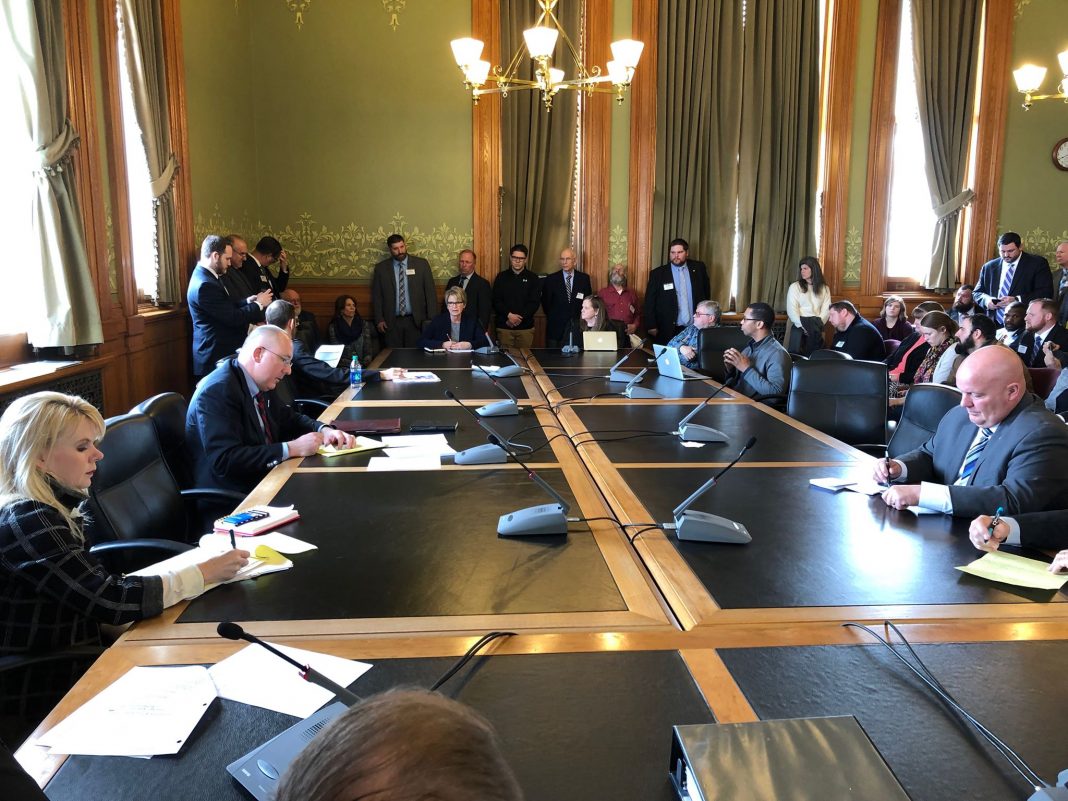The business community in Iowa seems at odds with the religious community. At least it was that way during Tuesday’s subcommittee for Senate File 240, which would be a Religious Freedom and Restoration Act (RFRA).
Concerns were voiced from a variety of economic and business parties that centered around economic consequences of a RFRA. Difficulty attracting new workers, hosting events and handling liability issues were all aired.
Connie Ryan of Interfaith Alliance of Iowa Action Fund spoke against the bill as well.
“Rule of law is important to all of us,” Ryan said. “Creating broad religious exemptions that allow people to pick and choose which laws they are going to follow or not weakens all of our laws.”
Ryan said her faith is an extremely important part of her life. But she continued to rip apart the legislation. She said the rights of those who are homosexual, women, racial minorities or have disabilities would be impacted.
She referenced a potential loss of revenue, citing what happened in Indiana during RFRA debates. Her denomination was going to have its general assembly in Indianapolis that year and if the law wasn’t changed, they were cancelling.
“Ironically the general assembly of the Christian Church Disciples for Christ is scheduled to be had in Des Moines this summer,” she said. “Over 4,000 people are scheduled to come to Des Moines, spending millions of dollars over six days. I am in conversations with our leadership and should this bill pass, it is extremely likely that the general assembly will not be held in Des Moines in July.
“Our denomination feels so strongly about RFRA and its racist, homophobic and Christian privilege underpinnings that St. Louis and Kansas City lost out on being considered specifically because Missouri has RFRA laws.”
There were plenty of people and groups speaking in support of RFRA.
Pastor Jeff Ferguson of Glory Baptist Church quoted Thomas Jefferson from 1786 after the first religious freedom act was enacted. He mentioned colonies that were established as religious sanctuaries for different denominations.
“There’s been a methodical and deliberate attack on religious liberty,” he said. “In 1962 removing prayer from schools. In 1963 removing Bible reading from schools. In 1980 removing the Ten Commandments from schools. In 2000 removing the Ten Commandments from the courthouse. In 2014 the mayor of Houston subpoenas five pastors’ sermon notes for a smear campaign. In 2017 Masterpiece Cakeshop’s refusal to participate in a private event — lost his business, his livelihood.
“I’m asking our senators to protect not just my right for my freedom of speech, my freedom of religion, but protect my right for a clear conscience between God and man. Please do not let a corporation put dollars and cents on liberty. It is our responsibility to restore religious liberty and protect both sides in the debate. All we’re asking is for a chance to stand unhindered in court.”
Joan Thompson of the Catholic Conference speculated what would happen in the health care field for workers who do not wish to participate in abortions, now that the Iowa Supreme Court cited a fundamental right to an abortion in the state’s constitution.
Chuck Hurley of The Family Leader said much of the arguments against the bill are predicated on lies.
“To me, the biggest issue of this hearing and this bill is the truth,” he said. “What is the truth about economic development? What does happen? I’m convinced that some in this room have been misled or perhaps lied to about the economic impact of passing a RFRA.”
Hurley read stats from the United States Department of Commerce. He said 21 states have adopted RFRAs. According to the Department of Commerce, in the year following RFRA’s passage, those states saw an average increase of 4.1 percent in the gross domestic product. Several states experienced GDP growth above six percent.
“There has been, what I would term, ganging up on — or…bullying,” Hurley said. “Talking about how this is going to devastate Iowa. The facts from the United States Department of Commerce do not back that up. My urging to you senators is that you look at the facts. Iowa would be the first state to have an economic hit from passing RFRA — it’s not true.”
Finally, Hurley warned against putting too much worry into all the threats delivered to the subcommittee.
“There’s something as important as listening to those threats and being concerned about a cancellation,” he said. “That is what our Founders and people all the way up until 2019 have fought and died for. That is our first freedom mentioned in our Bill of Rights.
“This tie that I’m wearing is illegal in 50 countries around the world. We have something special in the United States. RFRA has passed in the United States, I don’t believe we should call the United States a racist country because it passed RFRA. (President Bill) Clinton signed it, (Senators) Chuck Schumer and Ted Kennedy cosponsored the bill. RFRA is not racist and it does not harm economic development. I urge you to pass it for the fairness and keeping religious liberty sacred and special in Iowa.”
Republican Sen. Jeff Edler acknowledged more work to be done on the bill, but signed off in support.
Democrat Sen. Rob Hogg refused. He said he is somebody “who believes in the rule of law.”
“I think it would be a mistake for us to move forward with something that’s so controversial and really puts out a ‘You’re not welcome in Iowa’ sign to a lot of people,” he said. “I think the easiest thing to do is just say we gave it the hearing that people wanted and people had their hearing and now let’s stop it.”
Republican Sen. Dennis Guth said RFRA isn’t about figuring out who his right or wrong, instead it’s about respecting everyone’s beliefs without coercion.
“We would all like everyone else to believe the same thing that we do, but we need to make sure that we’re using reason and order to persuade them, not coercion in order to force them to act according to our beliefs,” Guth said. “It seems to me that today’s diversity is beginning to sound a lot like yesterday’s conformity.”
Guth talked about concern felt at many churches, clubs and schools in Iowa.
“I know of a college here in Iowa that has a very popular professor who suddenly decided to present as the opposite sex,” Guth said. “Employees are afraid of being fired if they forget and call this person by the wrong pronoun. Even worse, they see the confused looks on the students’ faces.”
He also talked about a youth camp where a boy presented as a girl and asked to be placed in a girls’ camp.
“This sort of thing is not what Iowa should be about,” he said. “Thought control is wrong. A Religious Freedom and Restoration Act will help bring balance and respect.”












